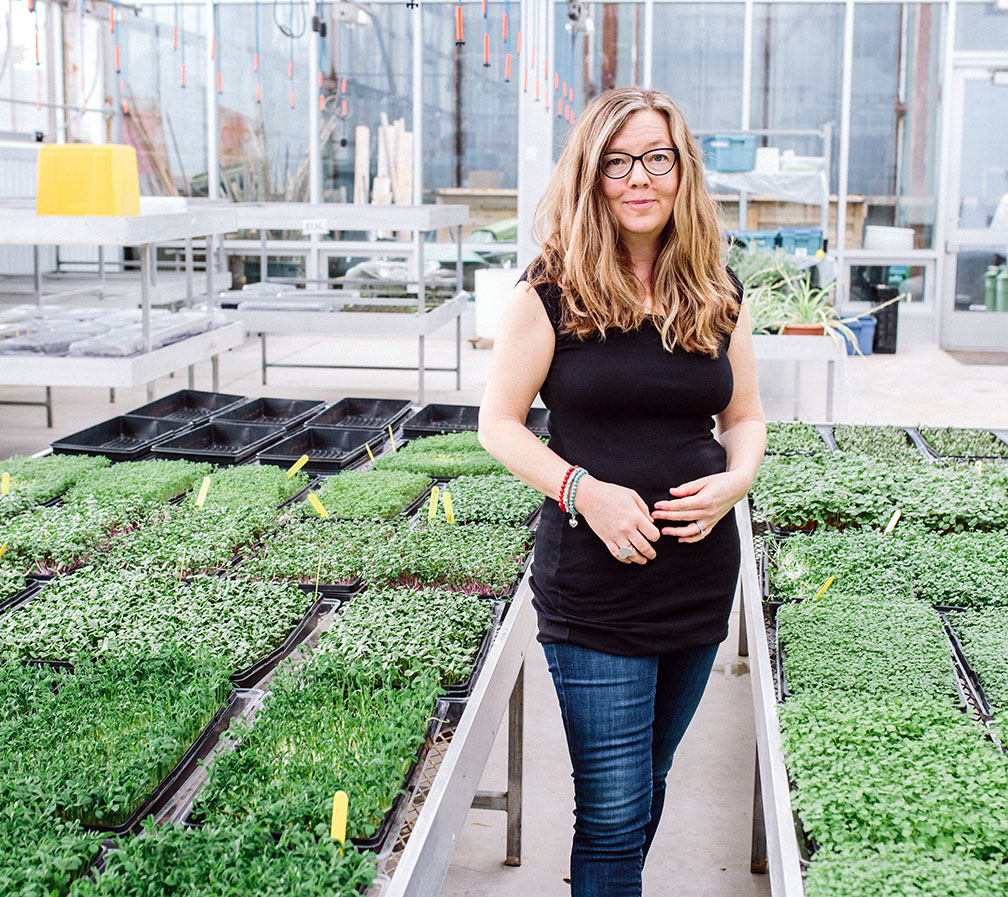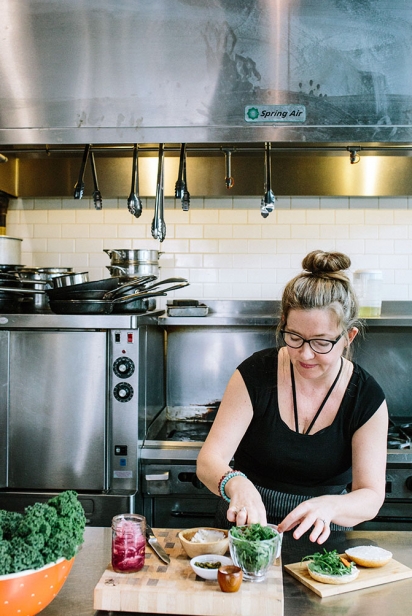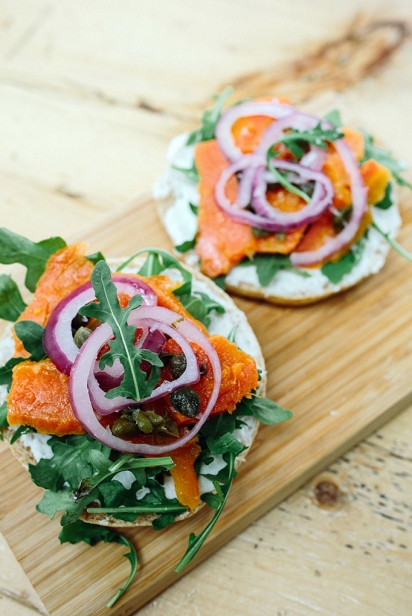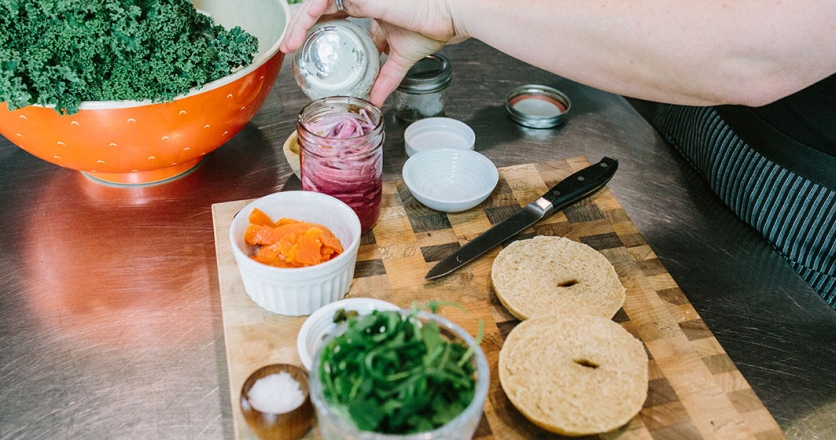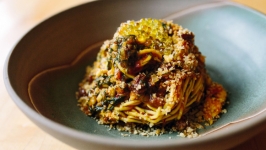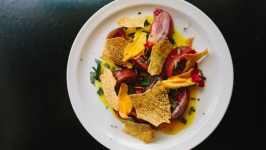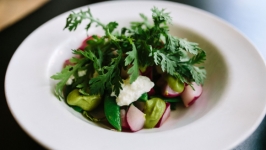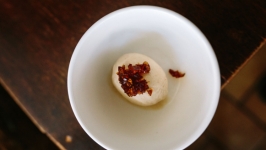The Vegan Coach
Anyone dubious about whether a vegan diet can fully fuel the human body needs to talk to Margie Cook. The Toronto-based vegan does menu consulting, product development and staff training for restaurants. She's a personal chef. She leads wellness luncheons for corporate clients. She coaches folks on becoming vegans, even those who are just toying with the idea. She contracts with homeowners to make over their kitchens so they can shift to eating vegan. She's setting up her commercial kitchen with a retail side. She's even done a cooking series for a home-schooled group.
Most of us carnivores get burned out just reading what Cook, a registered holistic nutritionist (RHN) and certified vegan lifestyle coach and educator (VLCE), does. And that whirling-dervish list of professional activities doesn't even include being a mother to four, two of whom are 13-year-old twins.
"I zig-zag all over the place," she admits with disarming amusement at her own daily pace. "It's been this bizarre journey to get to this point. I do think of it [all] as a business, but I have so much fun doing it that sometimes I have to give my head a shake."
Cook has no doubts that her veganism has not only inspired her diverse culinary career, but has also given her the energy to pursue it. "I haven't eaten animals since I was 22 years old. I have been fully vegan for eight years," says Cook, who is now 48. "I've never been happier. I've never been healthier."
Explaining that even before going fully vegan eight years ago, she'd restricted her non-plant intake to a bit of cheese and cream in her coffee, Cook says her vegetarian journey began in the early 1990s when she was travelling solo in the Middle East.
"I kept getting food poisoning, so I started eating just lentils and chickpeas and salads. When I came home, I just never went back [to meat]."
Veganism — which she now pursues because she believes it's better for her, for the planet and animals — has also freed up her head for more important things than worrying about what she eats.
"People have a lot of noise in their heads because they judge themselves for their food choices. I don't have any noise in my head and I don't contribute to factory farming."
That freeing up of her head has allowed her to engage her natural creativity and yielded some popular recipes. For example, her vegan menu for Il Fornello restaurants includes a Caesar salad with avocado, cashews, plant-based parmesan cheese and capers instead of fish. She's also created a smoked carrot dish. She says it's so close to smoked salmon that it freaks people out.
Food is "just memories," she says and if you can re-create a flavour or texture, you'll get a good response no matter what you're cooking. For instance, she says chicken only takes on a distinctive taste once it's been seasoned and cooked. "So, if you can take a piece of tofu or a cauliflower steak and marinade and season it with all the spices and flavour you traditionally use for chicken breast, it hits those same receptors and you go, ‘Oh, I think I just ate chicken!'"
Despite her commitment to veganism, Cook leaves it up to her four children to make up their minds about food choices. Of the four, only one is currently vegan.
"I will never push [my beliefs on them]," she says. "I say, ‘I need your help. I need you to try this and see if you like it.' These kids are smart and they recognize what we're doing to the planet."
Cook’s working background — no surprise here — is varied. In the earlier 2000s, she ran a high-end party rental service and owned a successful catering business. From 2010 to 2013, she managed business and marketing for the catering arm of the Stop Community Food Centre, a social enterprise in Toronto.
About 10 years ago, she decided to become a registered holistic nutritionist and graduated from the Canadian School of Natural Nutrition in 2010. She says holistic nutrition appealed to her because it looks at the connection between mind, body and spirit rather than just slapping a "bandage" on a symptom of illness (she also notes that, with young children at home, being able to study on her own at night was a plus.)
She could have trained as a dietician, but she says that would have meant a job in a hospital or other traditional setting. "I can't buy into that, with all the lobbyists and vested interests."
Cook finished her nutritional training with the intent of establishing a career in the field. It wasn't to be. "I keep getting drawn back into the kitchen," she says with a laugh.
She subsequently completed her certification as a vegan lifestyle coach and educator at Main Street Vegan Academy in New York City. She says there's a tribe of graduates from the immersion program around the world working in everything from food to the textile business, with all of them attempting to wean us off our dependence on animals.
Much as she loves her vegan-based work, Cook has no illusions about its challenges. She says she often feels like an outlier in a non-vegan world, part of a small group of people who think they have to defend the simple fact that they've chosen not to eat something. "I'm an intensely optimistic person. I don't want to spend my life arguing with people, so I choose to just feed people."
And while she is in demand (Toronto’s Mama Earth Organics, a food delivery service, is doing R&D incorporating some of her products), Cook has to hustle as much as anyone else who’s self-employed.
The cooking series for schools was a great idea, for example, but to make it fly would require taking it to regular schools: a problem when school boards are as strapped as they are for cash.
Cook says her kitchen makeover service can be remunerative (costing, in one case, $3,000), but there are only so many clients for it. And it's a lot of work on her part — everything from creating recipes and grocery lists to emptying, deep cleaning and re-organizing the kitchen, grocery shopping and bulk cooking key items to get the client going in a new and better dietary direction.
Hurdles aside, Cook wouldn't change what she's doing. "I look at food as an art form, a creative outlet. I love innovating and I find the plant kingdom so inspiring and endless."
Most satisfying, she says, is "the flexibility and the creativity and surprising people through food that they really don't have any intention of liking, but they really can't help it."
Margie Cook
plantson.ca | @_plantsonplates
Margie Cook's top tips for going vegan. 1] Be kind to yourself and others. If it makes it easier, don't tell anyone what you are doing until you've settled into it. And don't try to convert family and friends. We all travel our own road and I believe the best way to lead is by peaceful example. 2] Be prepared to detox a bit. Physical adjustment is normal and should last only a few days, if at all. Check online for typical signs and symptoms, get lots of rest and drink plenty of water. It won't be long before you notice positive differences in how your body and mind feel. 3] Don't overcomplicate your food. Invest in beautiful salt, pepper, oils and vinegars… they go a long way to enhancing your food and kicking your veganism up a notch. 4] Travel and socializing: Plan ahead and you'll be fine. Attending a party? Volunteer to bring some food — it takes the pressure off of your host and gives others a chance to try what you've made. And trust me, you'll need to bring extra because everyone will want to try it. 5] Grow something. Anything. Even if it is one pot of herbs on a balcony, it's edible magic. We are in our fifth year of growing an organic vegetable garden and there is nothing like the feeling of planting, watering, caring for and harvesting food. 6] Be okay with making mistakes. If there is one thing you can't pass on (cheese is the one I hear most often), then don't. But don't let that one thing stop you from passing on all the rest. 7] And don't be shy. Seek help by going online to read and share recipes, listen to podcasts, find a community. You do not have to go it alone. We are so much better together.


